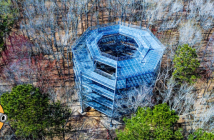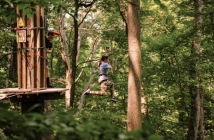SAM Magazine—Stowe, Vt., May 20, 2022—The Vermont Occupational Safety and Health Administration (VOSHA) investigation of the Sept. 23, 2021, death of Stowe Mountain Resort, Vt., ZipTour employee Scott Lewis, 53, found that the resort failed to retire the primary attachment lanyard per the manufacturer’s requirement.
The lanyard failed when Lewis hit the spring brake at the terminus of one of the high-speed zip lines, causing him to detach and be thrown into the concrete anchor, resulting in fatal injuries.
The manufacturer of the ZipTour, Terra-Nova LLC of Utah, updated its Operations and Maintenance Manual in 2017 to state that the nylon lanyards have a maximum lifespan of one year with heavy use, and should be replaced before the start of each season. Stowe Mountain Resort owner Vail Resorts refuted this change, according to the report.
Terra-Nova issued a Manufacturer Supplemental Bulletin/Safety Alert in October 2019 stating, in part: “The main attachment lanyard is an annual replacement item, on the condition they pass ALL daily and monthly inspections.” VOSHA found that Stowe Mountain Resort did not abide by Terra-Nova’s change in standards, and found that Stowe was not able to track the PPE within its system, and therefore could not confirm its full use and history.
Terra-Nova affirmed that the Petzl Jane lanyard Lewis was using was manufactured in 2017 and put into service in 2018. It was used for nearly three full seasons at the time of the incident. Terra-Nova performed the last documented annual inspection of the PPE in May 2019, and found the lanyard “showed glazing and excessive fuzziness.”
VOSHA also concluded that Stowe Mountain Resort failed to properly train employees in the proper care, maintenance, useful life, and disposal of PPE, and required PPE inspections and staff training or certifications were not documented. Additionally, staff were trained to tie overhand knots with a loop in the lanyard to prevent the belay device from descending the lanyard, which reduced the lanyard’s breaking strength to below the minimum 5000 lbs., and Stowe did not have a qualified or competent person inspect the overhand knot.
The original fines amounted to $40,959, but VOSHA and Stowe Mountain Resort came to a settlement of roughly $27,000. As part of the settlement, Stowe Mountain Resort agreed to close the ZipTour indefinitely “until a sufficient examination of the systems is completed and policies and procedures for safe employee usage are reviewed and enacted.” The attraction will remain closed this summer.







